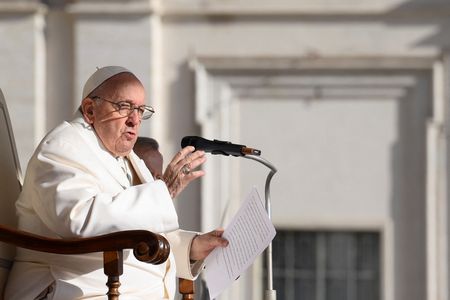By Crispian Balmer and Alvise Armellini
VATICAN CITY (Reuters) – Pope Francis has a respiratory infection and will need to spend “a few days” in hospital for treatment, the Vatican said in a statement on Wednesday, amid concern for the 86-year-old’s condition.
The 86-year-old pontiff was taken to Rome’s Gemelli hospital after complaining of breathing difficulties over the past few days, the statement said. Tests showed he had the infection but did not have COVID-19, it said.
“Pope Francis is touched by the many messages received and expresses his gratitude for the closeness and prayer,” the Vatican said.
Francis, who this month marked 10 years as pope, is sometimes short of breath and generally more exposed to respiratory problems. He had part of one lung removed in his early 20s when training to be a priest in his native Argentina.
His latest hospitalisation comes ahead of a Palm Sunday service on April 2 that marks the start of a hectic week of ceremonies leading to Easter Sunday on April 9, throwing into doubt whether he would be able to lead them as customary.
Francis’ health has attracted increased scrutiny in the past two years, during which he has undergone colon surgery and begun using a wheelchair or a walking stick due to chronic pain in one knee.
The Vatican had initially said the pope had gone to hospital on Wednesday for a scheduled check-up. But Italian media reported he arrived in an ambulance after cancelling a television interview at the last minute.
Francis had attended his weekly general audience in St Peter’s Square in the morning, appearing in good health.
‘WE NEED HIM’
In Argentina, the faithful offered prayers for the recovery of the pope, who has not returned to his homeland since leaving for the Vatican a decade ago.
“If the Pope could listen to us, I would tell him that we need him because the reform that he faced is not finished,” said Marcela Mazzini, a professor at Inmaculada Concepcion Seminary in Buenos Aires, where the pope, then called Jorge Mario Bergoglio, studied.
The country that the first Latin American pope left behind faces intense political division, 99% inflation and near 40% poverty.
“I think you won’t go away without coming to Argentina first,” said engineer Santiago, Goggi, 40, obliquely referring to the pope’s eventual demise as he sat on the seminary steps. “You have to come see us.”
The son of Italian immigrants, the future pope lived modestly when he was archbishop of Buenos Aires, travelling by public transport and keeping a low profile when he visited the poor in shanty towns, where many still remember him.
At the city’s cathedral, Daniel Saco, a 59-year-old former catechist, said Francis “must be asking himself if he can or can’t go on. He must be praying and asking all of the Catholic world to pray for him. He always says ‘Pray for me,’ and must be open to what God dictates to his conscience.”
HEALTH CONDITIONS
The leader of the world’s nearly 1.4 billion Roman Catholics suffers from diverticulitis, a condition that can infect or inflame the colon, and was operated on at the Gemelli hospital in 2021 to remove part of his colon.
He said in January that the condition had returned and that it was causing him to put on weight, but that he was not overly concerned. He did not elaborate.
Francis told Reuters in an interview last year that he preferred not to have surgery on his troublesome knee because he did not want a repeat of long-term negative side effects from anaesthesia that he suffered after the 2021 operation.
Last July, returning from a trip to Canada, Francis acknowledged that his advancing age and his difficulty walking might have ushered in a new, slower phase of his papacy.
But since then he has visited Kazakhstan and Bahrain and made a trip last month to Democratic Republic of Congo and South Sudan.
He has also committed to visiting Hungary in late April, Portugal in August and the French city of Marseille in September. He has said, if it can be arranged, he would want to then fly from Marseille to Mongolia.
After praising his late predecessor Benedict XVI’s historic decision to resign on health grounds in 2013, Francis has indicated he would follow the example only if he were gravely incapacitated.
Asked by Italian Swiss television RSI in an interview broadcast on March 12 what condition would lead him to quit, he said “A tiredness that doesn’t let you see things clearly. A lack of clarity, of knowing how to evaluate situations”.
(Reporting by Crispian Balmer, Alvise Armellini and Philip Pullella; Additional reporting by Miguel Lo Bianco in Buenos Aires; Editing by Alex Richardson, William Maclean and William Mallard)





